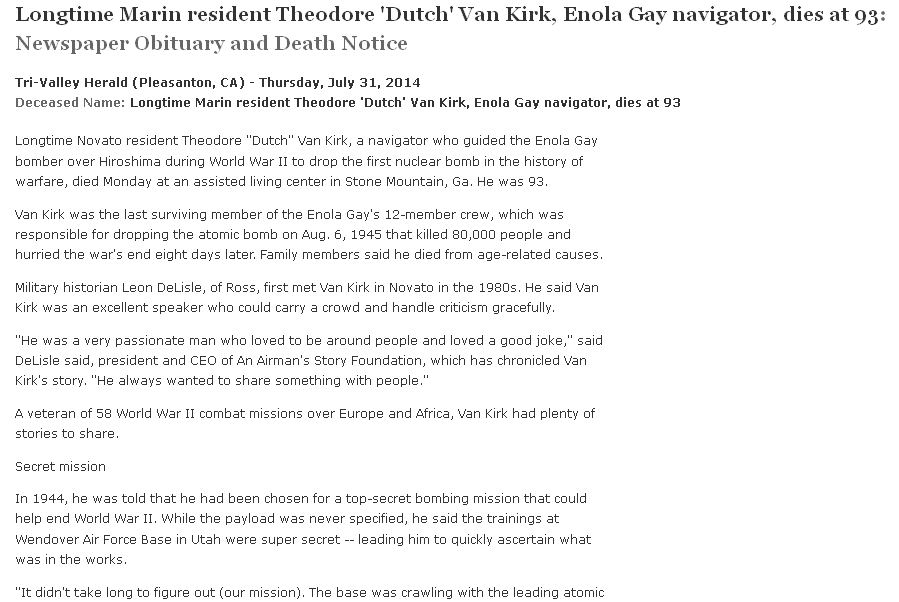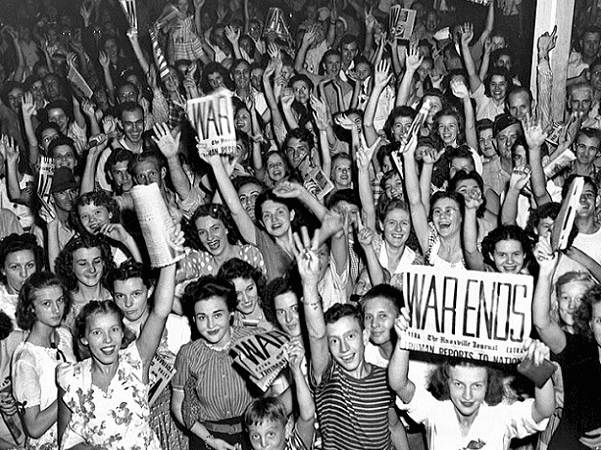Introduction: In this article, Scott Phillips searches old newspapers to find stories about the day Japan announced its surrender, ending World War II. Scott is a genealogical historian and owner of Onward To Our Past® genealogy services.
A few days ago I happened to notice an obituary in my local newspaper for Theodore “Dutch” Van Kirk. I read that this gentleman passed away in Stone Mountain, Georgia, at the age of 93. I was curious to learn why this obituary would be in my local paper when Stone Mountain, Georgia, is well over 700 miles away.

I soon discovered that his death was news across the entire United States—his obituary was published coast to coast. For example, this obituary was published in a California newspaper.

As this obituary explains:
Theodore ‘Dutch’ Van Kirk [was] a navigator who guided the Enola Gay bomber over Hiroshima during World War II to drop the first nuclear bomb in the history of warfare… Van Kirk was the last surviving member of the Enola Gay’s 12-member crew, which was responsible for dropping the atomic bomb on Aug. 6, 1945 that killed 80,000 people and hurried the war’s end eight days later.
The phrase “hurried the war’s end eight days later” refers to the fact that the announcement of Japan’s surrender was made on 14 August 1945 (which, due to time zone differences, was actually August 15 in Japan), in effect ending WWII.
This article from an Illinois newspaper presents Van Kirk’s own words describing the world-altering event he and his fellow Enola Gay crew members participated in that day.
“Dutch” died just two weeks shy of the 69th anniversary of the declaration of “V-J Day” (Victory over Japan Day), commemorating the Japanese surrender which marked the end of World War II. Note: although Japan’s surrender was announced in the U.S. on 14 August 1945, the formal surrender ceremony took place aboard the USS Missouri in Tokyo Bay on September 2—so both days can be called V-J Day.
Intrigued by Van Kirk’s story, I began to look for more historical information on V-J Day in GenealogyBank’s Historical Newspaper Archives to see how the news was reported—and to learn what our ancestors might have been doing that day.
Here is what the front page of this Louisiana newspaper looked like on Victory over Japan Day.
This photo spread from a California newspaper shows Americans celebrating the good news of Japan’s surrender and the ending of the war: streets jammed with huge, happy crowds, with celebrations of all types.
And speaking of end of war celebrations, on page three of that same newspaper was an article reporting that floodlights were lit at night after four years of darkness, almost every store in nearby towns was shuttered for the holiday—and from weeping telephone operators to an elevator attendant giving out free whisky to his riders, the whole of America seemed engaged in some type of revelry.
And why shouldn’t America have been celebrating with wild abandon? As the headline of this Ohio newspaper declared: the soldiers would finally be coming home!
Seven and a half million men (and women) coming home at last! I know my father, a 1st lieutenant in the U.S. Army, was among those men. While Dad fought throughout Europe, he and his men all had a terrible feeling of foreboding should they have to fight on the shores of Japan. But now they all knew that they’d be coming home.
While many Americans had been waiting out every second of time for V-J Day to finally arrive, this Texas newspaper article cleverly pointed out that a Mr. and Mrs. B. M. Day had enjoyed V. J. Day for 12 years already! It seems that their daughter was Vera Janice Day, and some smart reporter caught that cute tidbit amongst all the other excitement!
This Oregon newspaper article reported that Portland was already planning how to celebrate V-J Day even before Japan announced its surrender: “City fathers have no objection to John Q. Citizen’s celebrating in any manner he chooses so long as the peace is kept. ‘I am not interested in stopping people from showing their exuberance,’ the mayor said, ‘as long as property is not destroyed and the laws are observed.’” Sounds to me like Portland was surely going to rock for V-J Day!
Also on the home front, the impending end of the war was going to mean the end to rationing. Two days before V-J Day, a Massachusetts newspaper published this article listing many of the everyday items that were being rationed for the duration of the war, such as gasoline, tires, shoes, food and fuel oil. The old newspaper article speculated when that rationing might end after the formal surrender of Japan. Another family story I recall is that after my Dad returned home from the war, my Mom explained to him how challenging it was to live with rationing—and my Dad responded, with a chuckle: “I’d have traded anyone on the home front anything for the bullets and K-Rations!”
As we commemorate V-J Day today, I hope you will take a moment to reflect on what your ancestors might have been doing 69 years ago. I’d love to read your comments here!
